
 i_need_contribute
i_need_contribute

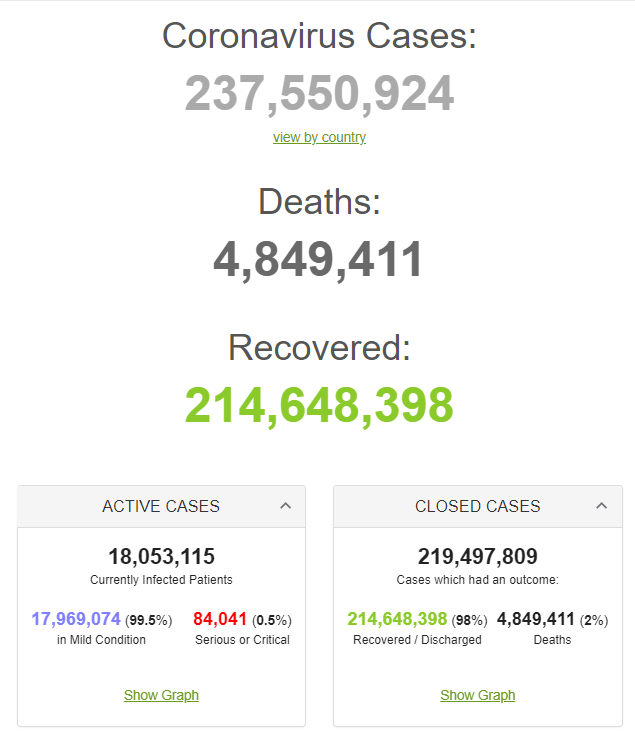
|
Country, |
Total |
New |
Total |
|
World |
237,522,194 |
+461,196 |
4,848,677 |
|
45,021,267 |
+102,090 |
730,206 |
|
|
33,914,465 |
+21,463 |
450,160 |
|
|
21,532,558 |
+15,044 |
599,865 |
|
|
8,046,390 |
+40,701 |
137,417 |
|
|
7,690,110 |
+27,550 |
213,549 |
|
|
7,357,336 |
+30,019 |
65,590 |
|
|
7,043,316 |
+4,615 |
116,991 |
|
|
5,674,083 |
+11,625 |
122,012 |
|
|
5,264,305 |
+1,086 |
115,416 |
|
|
4,971,310 |
+1,807 |
86,701 |
|
|
4,967,524 |
+1,677 |
126,517 |
|
|
4,692,274 |
+2,938 |
131,198 |
|
|
4,306,757 |
+22,403 |
94,910 |
|
|
4,224,487 |
+1,393 |
142,494 |
|
|
3,699,621 |
+7,697 |
280,607 |
|
|
2,916,969 |
+2,007 |
75,803 |
|
|
2,909,757 |
+989 |
88,104 |
|
|
2,632,881 |
+10,019 |
38,937 |
|
|
2,497,643 |
+15,125 |
57,840 |
|
|
2,313,727 |
+9,890 |
27,113 |
|
|
2,182,106 |
+923 |
199,581 |
|
|
2,018,667 |
+2,044 |
22,473 |
|
|
2,016,171 |
+2,746 |
18,200 |
|
|
1,707,752 |
+1,126 |
17,819 |
|
|
1,697,070 |
+1,048 |
30,494 |
|
|
1,678,297 |
+11,200 |
17,418 |
|
|
1,659,386 |
+942 |
37,533 |
|
|
1,651,233 |
+4,091 |
28,141 |
|
|
1,560,818 |
+663 |
27,647 |
|
|
1,318,367 |
+14,467 |
38,542 |
|
|
1,300,968 |
+2,379 |
7,882 |
|
|
1,256,191 |
+2,604 |
25,649 |
|
|
1,255,321 |
+1,453 |
28,032 |
|
|
1,073,268 |
+731 |
18,019 |
|
|
988,307 |
+6,978 |
8,582 |
|
|
937,631 |
+668 |
14,413 |
|
|
907,941 |
+3,833 |
7,742 |
|
|
898,225 |
+2,063 |
11,422 |
|
|
830,944 |
+1,056 |
10,783 |
|
|
826,837 |
+4,150 |
20,223 |
|
|
826,636 |
+837 |
30,259 |
|
|
800,282 |
+667 |
11,200 |
|
|
755,797 |
+1,965 |
11,072 |
|
|
737,373 |
+144 |
2,109 |
|
|
709,222 |
+221 |
24,987 |
|
|
671,040 |
+2,229 |
15,042 |
|
|
628,241 |
+519 |
8,375 |
|
|
626,058 |
+2,228 |
9,162 |
|
|
574,713 |
+2,610 |
13,902 |
|
|
551,800 |
+1,983 |
4,243 |
|
|
547,449 |
+47 |
8,736 |
|
|
542,653 |
+1,617 |
6,584 |
|
|
523,550 |
+772 |
13,229 |
|
|
516,510 |
+2,302 |
21,505 |
|
|
511,699 |
+153 |
32,836 |
|
|
502,550 |
+503 |
18,775 |
|
|
489,226 |
+1,013 |
6,625 |
|
|
474,019 |
+994 |
18,034 |
|
|
468,545 |
+220 |
7,259 |
|
|
460,138 |
+25 |
16,205 |
|
|
420,924 |
+1,451 |
12,705 |
|
|
413,665 |
+1,748 |
8,730 |
|
|
411,981 |
+46 |
2,452 |
|
|
411,526 |
+946 |
4,197 |
|
|
397,831 |
+1,206 |
5,280 |
|
|
389,661 |
+156 |
6,062 |
|
|
379,352 |
+1,519 |
4,576 |
|
|
369,030 |
+376 |
9,949 |
|
|
363,735 |
+886 |
4,063 |
|
|
362,068 |
+607 |
2,668 |
|
|
352,504 |
+1,166 |
5,888 |
|
|
345,145 |
+2,232 |
5,160 |
|
|
344,847 |
+915 |
4,739 |
|
|
325,800 |
+2,421 |
2,544 |
|
|
319,247 |
+2,237 |
1,391 |
|
|
309,934 |
+799 |
17,584 |
|
|
303,915 |
+20 |
4,101 |
|
|
303,208 |
+1,777 |
6,954 |
|
|
299,242 |
+968 |
4,600 |
|
|
275,458 |
+64 |
1,390 |
|
|
268,672 |
+1,309 |
5,466 |
|
|
250,728 |
+218 |
5,178 |
|
|
237,225 |
+78 |
607 |
|
|
209,283 |
+35 |
3,653 |
|
|
207,167 |
+544 |
2,742 |
|
|
204,276 |
+105 |
5,843 |
|
|
193,846 |
+388 |
6,783 |
|
|
192,587 |
+508 |
871 |
|
|
180,438 |
+241 |
2,376 |
|
|
179,036 |
+104 |
2,614 |
|
|
176,964 |
+487 |
1,260 |
|
|
173,723 |
+533 |
2,746 |
|
|
166,553 |
+1,752 |
2,783 |
|
|
161,781 |
+949 |
1,387 |
|
|
119,270 |
+231 |
558 |
|
|
43,775 |
+366 |
944 |
|
|
15,587 |
+9 |
169 |
Retrieved from: https://www.worldometers.info/coronavirus/
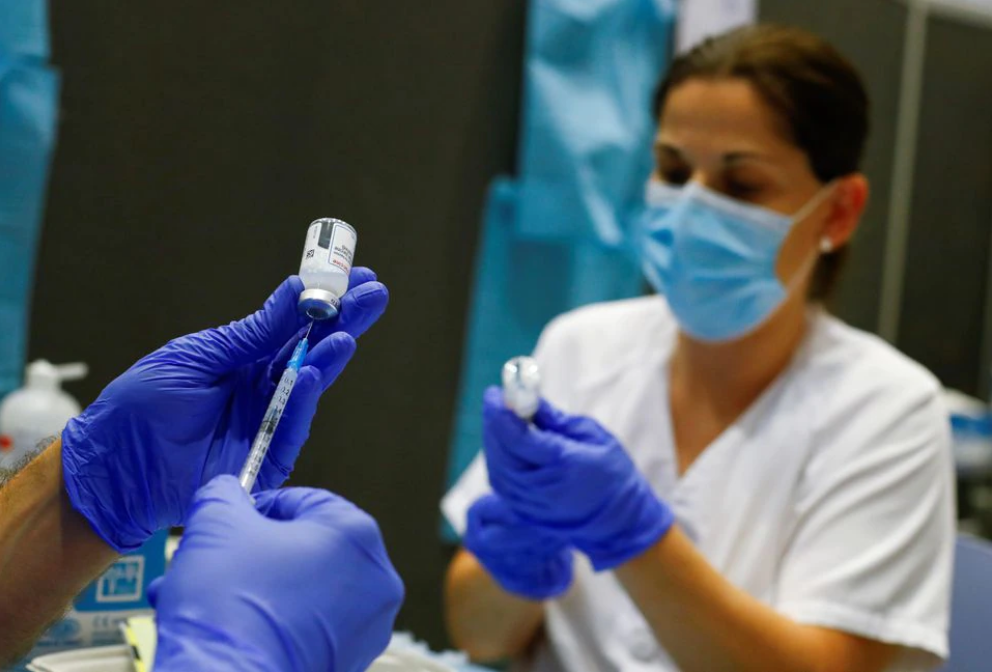
Nurses prepare syringes with doses of the Moderna vaccine against the coronavirus disease (COVID-19) at a vaccination centre in Meloneras on the island of Gran Canaria, Spain, July 28, 2021. REUTERS/Borja Suarez
Spain's coronavirus incidence dropped below 50 cases per 100,000 people on Thursday, reaching the threshold considered "low risk" by the Health Ministry for the first time in over a year.
More than three quarters of the Spanish population has now been fully vaccinated against COVID-19 and most restrictions on socialising have recently been dropped, although masks remain mandatory in enclosed spaces.
The Health Ministry on Thursday added 1,807 cases to its tally of infections, bringing the total up to 4.97 million since the pandemic began. The death toll rose by 23 to 86,701.
The infection rate, as measured over the past 14 days, fell to 49 cases per 100,000 people, the data showed, slipping below 50 for the first time since July 27, 2020.
At that time Spain had just emerged from one of Europe's strictest lockdowns, which reduced new cases to a trickle.
But transmission soon rebounded, infecting millions over four successive waves and pushing the incidence to a record 900 cases per 100,000 people at the end of January, before the vaccination campaign kicked into high gear.
https://www.reuters.com/world/europe/spains-covid-19-rate-low-risk-level-first-time-15-months-2021-10-07/
Malaysia has granted conditional approval for the COVID-19 vaccine made by Pfizer (PFE.N) and BioNTech (22UAy.DE) to be used as a booster shot, the health ministry said on Friday.
The approval allows the vaccine to be used only on adults aged 18 and above, at least six months after they have received their second dose, the ministry said in a statement.
Authorities earlier said booster shots would not be compulsory but were highly recommended for those in vulnerable and high-risk groups.
The mixing of different vaccines will also be allowed for booster doses. In addition to the Pfizer-BioNTech shot, Malaysia uses vaccines made by Britain's AstraZeneca (AZN.L) and Chinese firms Sinovac (SVA.O) and CanSino Biologics (6185.HK) in its national inoculation campaign.
About 64% of Malaysia's 32 million population are fully vaccinated, including 89% of adults.
https://www.reuters.com/world/asia-pacific/malaysia-approves-use-pfizer-biontech-vaccine-booster-shot-2021-10-08/
By Nick Cumming-Bruce, Constant Méheut and Niki Kitsantonis
The World Health Organization said on Thursday that it had resumed shipments of medical supplies to North Korea to help its Covid-19 response, in what appears to signal a relaxation of the closed-border policies enforced by Pyongyang early in the pandemic.
The agency said its shipments of medical supplies, together with other international supplies destined for North Korea, had become stranded in China after Pyongyang sealed the country’s borders in January 2020 when Covid-19 was declared a public health emergency of international concern.
North Korea’s Ministry of Public Health told the agency several months ago that it would allow the stranded supplies to be transported through the northern Chinese port of Dalian, a W.H.O. spokesman, Tarik Jasarevic, said in an emailed statement.
As a result, the agency had sent some of the medical supplies and equipment to the North Korean port of Nampo, he said.
North Korea has not reported any Covid-19 infections, and it turned down several offers of vaccines, including ones from the United Nations-backed Covax facility and from Russia. But North Korea’s leader, Kim Jong-un, said in June that lapses in his country’s anti-pandemic campaign had caused a “great crisis” that threatened “grave consequences,” according to the state media. He did not clarify whether he was referring to an outbreak within the country.
The W.H.O. said its shipments to North Korea included health kits, medicines and other medical supplies that would support essential health services at primary health care centers.
The agency said it had been told that these supplies remained under quarantine in Nampo.
In other news from around the world:
The authorities in France announced that, as of Oct. 15, coronavirus screening tests would no longer be free for unvaccinated people, signaling a new phase in the government’s strategy to encourage inoculations. The change means that unvaccinated people will bear the financial burden of meeting the proof of coronavirus status required by a law enacted this summer before they can enter cafes, restaurants, theaters and many other indoor venues.
The 14-day average of new daily coronavirus cases in Spaindropped below 50 per 100,000 people on Thursday for the first time in more than a year, Reuters reported. Prime Minister Pedro Sánchez called the return to low-risk status “a crucial milestone on the road to recovery” on Twitter.
Starting on Saturday, Greece will begin a two-week test of lifting some pandemic restrictions in regions where coronavirus cases have been the highest, but for the most part, only vaccinated people will be able to enjoy the heightened freedom. The restrictions — notably a curfew from 1 a.m. to 6 a.m. and a ban on music in bars and restaurants — were imposed last month in “red areas” across much of the country’s north and parts of its center, as a way to fight a fourth wave of the virus. But unvaccinated people who cannot prove that they recently recovered from Covid remain barred from indoor venues like bars, cafes and restaurants.
Even as parents in the United States wrestle with difficult questions over vaccinating their children against the coronavirus, families in other countries have been offered a novel option: giving children just one dose of the vaccine. Officials in Britain, Hong Kong, Norway and other countries have recommended a single dose of the Pfizer-BioNTech vaccine for children ages 12 and older — providing partial protection from the virus, but without the potential harms occasionally observed after two doses. On Wednesday, Sweden and Denmark announced that adolescents should get only one jab of the Moderna vaccine.
The British government said Thursday that international travel restrictions will be further relaxed next week by removing the hotel quarantine requirement for arrivals to England from 47 countries, including South Africa, Mexico and Thailand. The change comes into effect on Monday, and only seven countries will remain on the “red list” of visitors required to to enter hotel quarantine for 11 nights.
New figures by the Robert Koch Institute show that Germanyhas vaccinated 3.5 million more people against the coronavirus than previously thought. The country’s health minister said Thursday that some vaccinations, particularly of employees at big companies or those given by mobile vaccination teams, may have not been fully reported.
Retrieved from: https://www.nytimes.com/2021/10/07/world/asia/north-korea-who-covid-pandemic.html
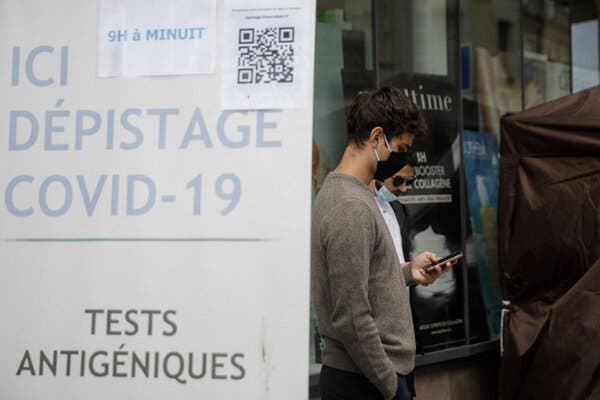
Lining up at a pharmacy to book a Covid-19 test in Deauville, France, in August.Credit...Sameer Al-Doumy/Agence France-Presse — Getty Images
Covid screening tests in France will no longer be free for unvaccinated people starting on Oct. 15, according to the French authorities, a change that signals a new phase in the government’s strategy to quell coronavirus infections by encouraging people to get inoculated.
Unvaccinated people will now essentially have to pay to enter cafes, restaurants and theaters, because under a law enacted this summer, entering many indoor venues requires proof of being fully vaccinated, of a recent negative test or of a recent Covid-19 recovery.
Tests will remain free for vaccinated people.
The introduction of the health pass prompted large protests over the summer, with demonstrators including people calling it an infringement on their freedom, vaccine conspiracy theorists, and activists on the far left and the far right.
A sharp decline in the number of protesters and a surge in vaccination rates in recent months suggest that President Emmanuel Macron’s gamble to increase restrictions to encourage vaccination has paid off.
But with vaccination rates lagging again in recent weeks, the government renewed its mixture of mandates and inducements — including an ad campaign promoting the “desirable” effects of vaccines — to encourage people to get vaccinated.
France, one of the most vaccine-sceptical countries in the world, has now fully inoculated nearly 70 percent of its population against the coronavirus, one of the highest rates in Europe, according to data from The New York Times.
Covid tests for unvaccinated people will cost $25 to $50, according to French press reports.
“It is no longer legitimate to pay for unlimited comfort tests at taxpayers’ expense,” Prime Minister Jean Castex told the newspaper Les Echos last month, adding that tests prescribed by a doctor and those for minors would continue to be reimbursed.
Retrieved from: https://www.nytimes.com/2021/10/07/world/europe/france-covid-test-charge-unvaccinated.html
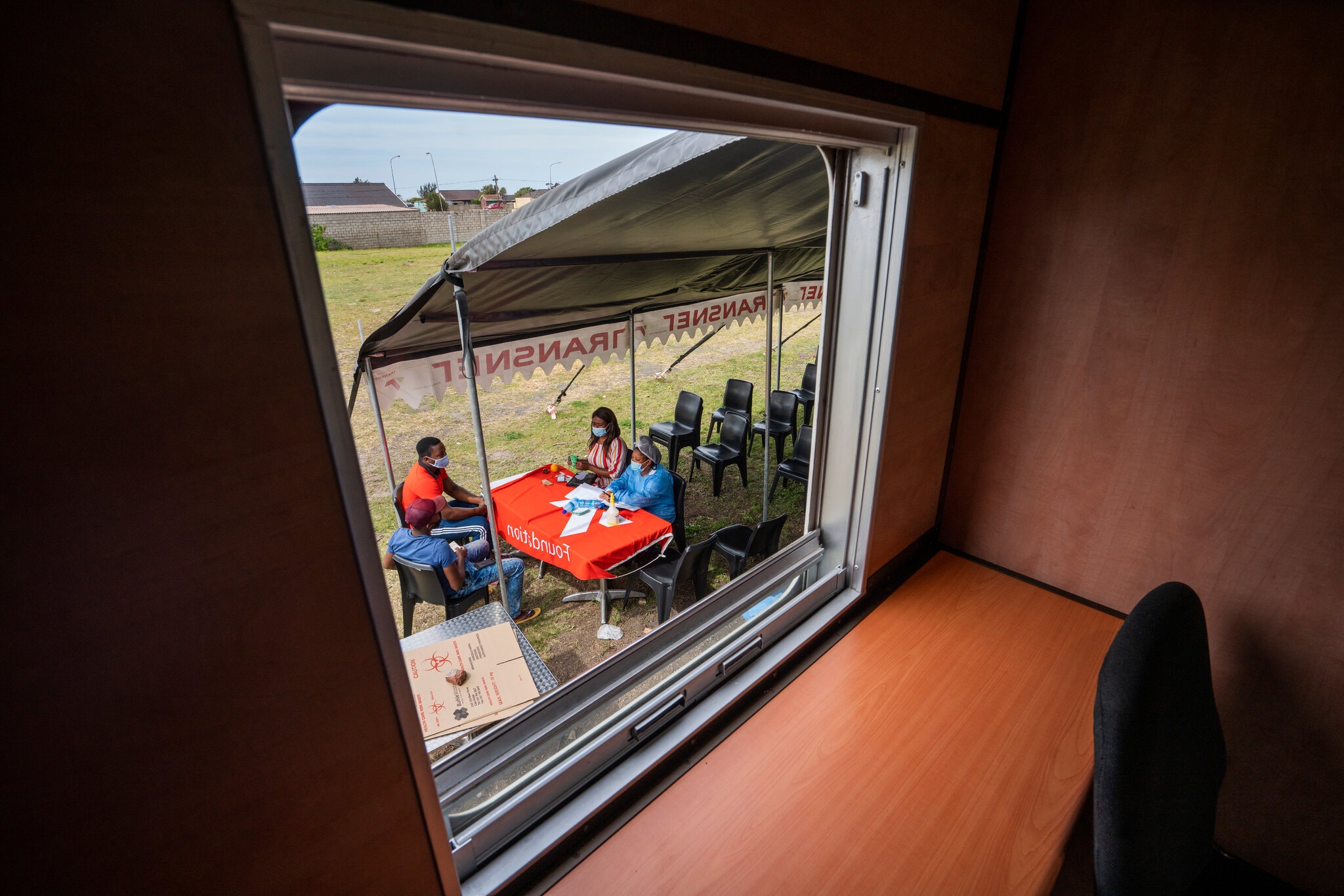
Medical personnel briefing people waiting for Covid vaccination last month outside Gqeberha, South Africa.Credit...Jerome Delay/Associated Press
JOHANNESBURG — Moderna said on Thursday that it planned to build a vaccine manufacturing facility in Africa, news that was welcomed for the long-term but that does not address the continent’s immediate need for Covid-19 vaccines.
The company said that a new “state of the art” facility would eventually produce up to 500 million doses a year of Moderna’s mRNA vaccine, which has shown an efficacy rate of more than 90 percent in preventing Covid-19. The plant will, in time, also produce other Moderna vaccines, the company said.
However, Moderna gave no time frame, and said it was only now beginning the process of identifying which country would host the plant.
Building vaccine manufacturing sites in Africa will increase the continent’s future access to the drugs. But that does not answer calls from African leaders and activists to waive patent laws that would give more drugmakers access to details on how coronavirus vaccines are produced. It also does not address the continent’s immediate Covid-19 vaccine shortages.
“It doesn’t necessarily solve our problems today,” Dr. John Nkengasong, the director of the Africa Centers for Disease Control and Prevention, said in a regular news briefing on Thursday. “The problems we have are quick access to vaccines, redistribution of vaccines, making sure that certain licenses are provided so that manufacturing can start regionally.”
Moderna’s announcement comes amid mounting pressure on biotech firms to share their expertise with manufacturers in countries that desperately need more coronavirus vaccine doses.
The drug makers Pfizer and BioNTech said in July that they had partnered with Biovac, a public-private partnershippharmaceutical company in Cape Town. In Gqeberha, the South African coastal city formerly known as Port Elizabeth, Johnson & Johnson has partnered with Aspen, a local manufacturer, in a fill-and-finish manufacturing process.
Moderna said that it expected to invest up to $500 million in its future site, and that its facility would manufacture the doses with fill-and-finish capacity, in addition to packaging facilities.
“While we are still working to increase capacity in our current network to deliver vaccines for the ongoing pandemic in 2022, we believe it is important to invest in the future,” said Stephane Bancel, Moderna’s chief executive.
African leaders had already established the Partnerships for African Vaccine Manufacturing, which works within an existing “ecosystem” of Africa’s vaccine needs. Launched in April, it has political backing from the continent’s leaders, including Presidents Cyril Ramaphosa of South Africa and Paul Kagame of Rwanda.
Moderna, an American drug company, developed its coronavirus vaccine with billions of dollars in taxpayer money and receivedinitial research and development funding from Covax, the vaccine sharing facility supported by the global vaccine alliance Gavi and the World Health Organization.
Retrieved from: https://www.nytimes.com/2021/10/07/world/africa/covid-moderna-africa.html
By Dana Goldstein and Jacey Fortin
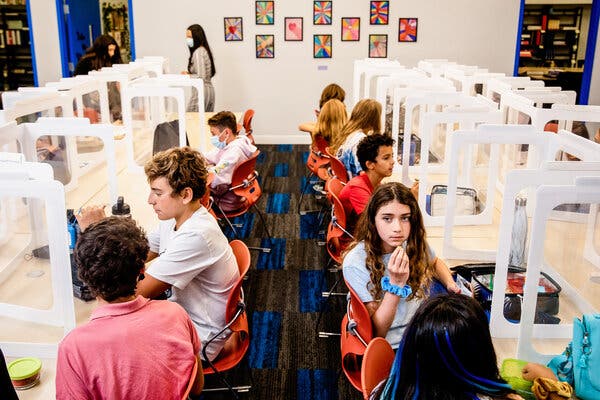
Schools have embraced a range of different preventive measures to keep children safe. Above, middle school students having lunch in Miami.Credit...Scott McIntyre for The New York Times
With schools fully reopened last month, the Delta variant drove many worries: Would crowded classrooms run up infection rates? Would outbreaks keep many schools closed? Could there be a normal academic year — the first since the pandemic began?
The news so far has been reassuring: The vast majority of the nation’s 50 million public school students have been in classrooms, full time and mostly uninterrupted, this fall — whether students are masked or unmasked, teachers vaccinated or not. In fact, infection rates declined 35 percent nationally through the month of September, as many schools opened their doors.
Still, it hasn’t always been pretty. Parents protested at school board meetings over mask mandates, or the lack of them. Families had to scramble because of stay-at-home orders. And virus-infected students and teachers prompted worries about the possibility of a spread in schools.
Yet in the sometimes chaotic reopening, there has been dramatic progress. Virus-driven school closures declined steeply from the end of August to late September, from about 240 a week to about 25 a week, according to a survey by Burbio, a company that has monitored district responses to the pandemic. Many districts have relaxed quarantine guidelines, allowing more students to remain in classrooms. And three-quarters of the nation’s 200 largest school districts began October with a mask mandate.
More progress may be made, given that Pfizer and BioNTech asked federal regulators on Thursday to authorize emergency use of their vaccine for children ages 5 to 11.
Now schools face the question of what comes next. In conservative areas like Wyoming, with fewer safety measures, some schools want to figure out how to encourage more people to get vaccinated. In parts of Georgia that have started requiring masks in schools, there is debate over how much it will help. And in liberal districts like Boston, where infection rates are low, some parents are beginning to question how long masking will be necessary.
These debates reflect a larger societal question: How should we live with Covid, since it appears to be here to stay?
· England’s latest ‘red list’ restrictions have confounded many South Americans. Strict Covid travel rules remain in place for seven South American and Caribbean countries in a move which has prompted further fury and confusion in the nations which remain on the ‘red list’.
· The NHS also aims to issue 35m flu jabs in a bid to immunise a record 35 million people – more than half the UK’s population.It would be the most ambitious programme of flu jabs in NHS history as the country prepares to face its first winter with Covid and flu circulating at the same time. Experts have warned there could be up to 60,000 deaths.
· A coronavirus report warned of the impact on the UK four years before the pandemic began, the Guardian can reveal. Senior health officials who war-gamed the impact of a coronavirus hitting the UK, warned of the need for stockpiles of PPE, a computerised contact tracing system and screening for foreign travellers.
· Italy has increased the maximum attendance capacity allowed at cultural and sporting venues for those who can show documents of immunity. As of 11 October, cinemas, theatres and concert venues will be able to fill all their seats, scrapping the current limit of 50%, the government said, following advice from its panel of public health advisors. The maximum capacity of sports stadiums will be raised to 60% from 35% for indoor venues and to 75% from 50% outdoors.
· Children could be forced to wear masks in schools across England again as part of the government’s back-up plan if the country’s Covid situation deteriorates significantly, the education secretary has admitted.
· Meanwhile, a Covid vaccine for children aged five to 11 is another step closer to authorisation in the US, with Pfizer-BioNTech announcing that the full application has been submitted to the US Food and Drug Administration (FDA).
· US president Joe Biden advocated for Covid-19 vaccination requirements, calling on more business owners to enact them. Speaking in Illinois, he said: “vaccination requirements are good for the economy”.
· Finland announced it will pause the use of Moderna’s vaccine for men under-30 due to reports of a rare cardiovascular side effect. It follows similar moves by Swedish and Danish health officials after a pan-Nordic study.
· More than 140,000 US children lost a parent or caregiver to Covid, a study found. Published on Thursday in the journal Pediatrics, the study estimated that from April 2020 through June 30 this year, more than 140,000 children under the age of 18 lost their mother, father, or grandparent who provided their housing, basic needs and daily care to the disease.
· In the UK, a further 40,701 Covid infections were reported in the past 24 hours – the highest daily figure since 6 September.
· UN secretary-general Antonio Guterres has appealed for $8 billion to help vaccinate 40% of people in all countries by the end of the year. It comes as the World Health Organization(WHO) launched a plan that aims to inoculate 70% of the world by mid-2022.
Retrieved from: https://www.theguardian.com/world/live/2021/oct/08/coronavirus-live-biden-urges-vaccine-mandates-papua-new-guinea-faces-worst-wave-yet